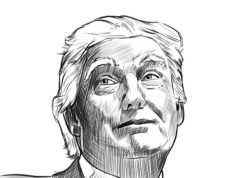
Following the overthrow of Sudanese President Omar Al-Bashir, Defense Minister Awad Ibnuf was sworn in as head of the new military council. Ibnuf has taken the oath of office, Chief of Staff Kamal Abdelmaruf has been appointed his deputy, reported the state television.
Ibnuf had previously announced „the overthrow of the regime“ and the imprisonment of Al-Bashir, saying that a military council would be set up for a transitional period of two years. After that, there should be elections.
Demonstrations against „military coup“
Despite the nocturnal curfew, thousands of demonstrators gathered in front of the army headquarters in Khartoum and shouted slogans such as „peace, justice, freedom,“ eyewitnesses said.
The one-month nocturnal curfew announced by Ibnuf began at 10 pm. It was supposed to be aimed above all at protesters who had been stationed in front of Army headquarters in Khartoum since Saturday every night to pull the military to their side.
The authoritarian ruling head of state for three decades had been overthrown by the military on Thursday. The leaders of the protests rejected the „military coup“ and called for further demonstrations. They demand a civilian council instead of a military council.
US canceled talks
The US continued its talks with the African country about a normalization of relations. „The Sudanese people should determine who heads it in the future,“ a Foreign Ministry spokesman said. The people made it clear that civilians should lead the transitional phase. „That should not be allowed for them in two years.“
The so-called „Phase II“ talks between the United States and Sudan were launched after the US administration under Barack Obama launched the lifting of a 20-year embargo on the country. This was to recognize that Sudan had helped fight the IS militia and made progress in respecting human rights.
Protests for months
Tens of thousands had protested for months against the rule of Al-Bashir. The demonstrations were triggered by price increases for food and other everyday necessities, which in turn are linked to the severe economic crisis. Over time, they increasingly turned against the authoritarian leader himself.
Al-Bashir is blamed for the violent deaths of millions of people in Darfur, the Nuba Mountains and other conflict areas in Sudan and southern Sudan. The International Criminal Court seeks a warrant for genocide. Many states have outlawed Sudan under its rule.
In February, Al-Bashir declared a state of emergency, dissolved his state and state governments, and declared he would step down as head of the ruling party. This did not defuse the situation.



